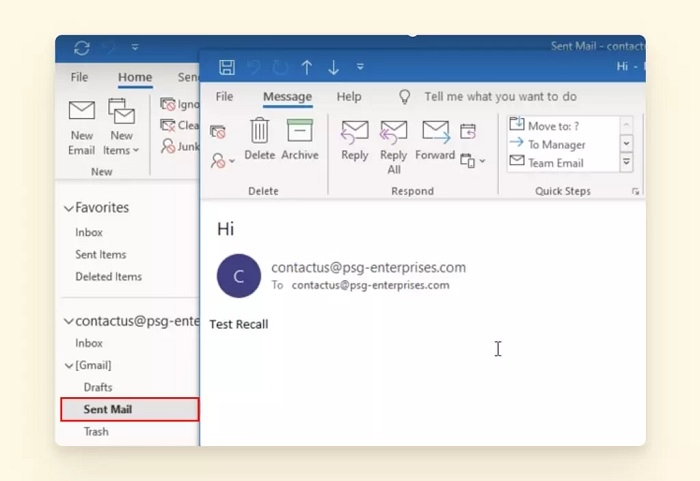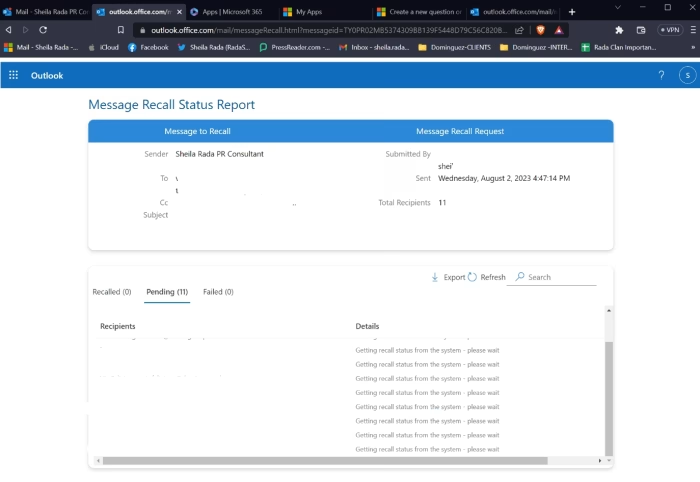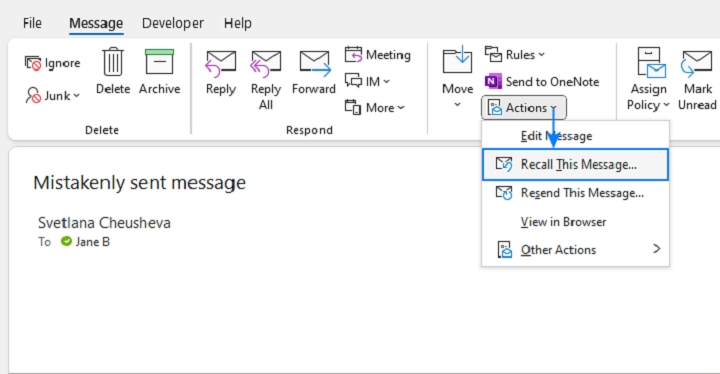Accidentally sent an email with a typo, missing attachment, or wrong recipient? If you’re using Microsoft Outlook, there’s a built-in feature that may help: the ability to recall a message. The Outlook recall an email function allows users to delete or replace a message that has already been sent—under certain conditions. This comprehensive guide covers how to use this feature, when it works, why it may fail, and what alternatives are available.
What Is the Outlook Recall Email Feature?

Outlook’s “Recall This Message” feature gives users the ability to:
- Delete unread copies of a sent email from a recipient’s inbox.
- Replace the original message with a new, corrected version.
However, this function only works under specific conditions and isn’t guaranteed to succeed.
When Can You Recall an Email in Outlook?
To successfully recall an email, the following conditions must be met:
- Outlook desktop app must be used by both the sender and recipient.
- Microsoft Exchange or Microsoft 365 account must be used.
- Recipient must be in the same organization or domain.
- The email must be unread.
- The email must still be in the inbox.
If any of these criteria are not met, the recall may fail.
Step-by-Step: How to Recall an Email in Outlook
Open the Sent Message
- Open Microsoft Outlook on your desktop.
- Go to the Sent Items folder.
- Double-click the email you want to recall to open it in a new window.
Access Recall Feature
- In the email window, navigate to the Message tab.
- Click on Actions in the “Move” section of the ribbon.
- Select Recall This Message from the dropdown.
Choose Recall Options
A dialog box will appear:
- Delete unread copies of this message
- Delete unread copies and replace with a new message
Choose the option that suits your needs. If you choose to replace the message, Outlook will open a new email window for edits.
Track Recall Status (Optional)
Check “Tell me if recall succeeds or fails for each recipient” to receive notifications on the recall attempt results.
Finalize Your Action
Click OK to execute the recall. If replacing, edit the new message and send it.
Why Email Recall in Outlook May Fail
There are several reasons your recall might not succeed:
The Recipient Already Opened the Email
Once opened, the email cannot be recalled. Outlook only allows deletion of unread messages.
The Recipient Isn’t Using Outlook Desktop
If the recipient is on Outlook Web, mobile, Gmail, or any other client, the recall won’t work.
The Message Was Moved Automatically
If a rule moved the message to a folder other than the inbox, recall will fail.
Cross-Organization Recipients
Recall won’t work if the recipient is outside your Microsoft Exchange organization.
Tips to Improve Recall Success
Act Quickly
The faster you initiate the recall after sending, the better the chances it will be successful.
Enable “Undo Send” in Outlook Web
Outlook.com users can’t use recall, but they can delay sending with the Undo Send feature:
- Go to Settings > Mail > Compose and Reply.
- Scroll to Undo Send and set the delay time (up to 10 seconds).
Use Delay Delivery in Outlook Desktop
To buy yourself time to cancel outgoing messages:
- While composing a message, go to Options > Delay Delivery.
- Under “Delivery options,” check Do not deliver before and set a delay time.
Alternative Strategies If Recall Fails
Send a Follow-Up Correction
If your recall doesn’t succeed, send a new message to clarify or correct the mistake.
Use Professional Apologies
Be concise and professional. Reference the previous message and clearly state what went wrong and what should be corrected.
How to Check Recall Status in Outlook

If you enabled notifications during recall:
- You’ll receive a success or failure report for each recipient.
- You’ll be able to see whether the message was read before recall.
You can also manually verify by checking the Tracking tab inside the sent message.
Recalling vs Replacing Emails in Outlook
| Action | Description | Works If Email Is Unread? | Editable? |
| Recall Message | Deletes unread copies of the original message | ✅ Yes | ❌ No |
| Recall and Replace | Deletes and lets you send a corrected version | ✅ Yes | ✅ Yes |
| Undo Send (Web Only) | Delays sending for up to 10 seconds | ✅ Yes | ✅ Yes |
Common Mistakes to Avoid
- Trying to recall messages after hours or days.
- Assuming recall works on Outlook Web or mobile.
- Sending confidential emails without delay safeguards.
- Not confirming recall requirements before use.
Best Practices to Avoid Using Recall
Use Drafts
Write important or sensitive emails in drafts and review them carefully before sending.
Add Delays to Every Email
Create a rule to delay all outgoing emails by a few minutes:
- Go to File > Manage Rules & Alerts.
- Create a new rule for outgoing messages.
- Set the action to “defer delivery by X minutes.”
This adds a safety buffer to catch errors.
Use Send Confirmation Add-ins
Outlook add-ins can prompt you before sending emails—great for double-checking recipients or confirming attachment inclusion.
Frequently Asked Questions
Can I recall an email in Outlook Web App?
No, the recall feature is only available in the Outlook desktop version.
How do I know if my email recall worked?
Outlook will send you a notification if you selected the option to receive status updates.
Can I recall an email sent to a Gmail or Yahoo account?
No, recall only works within your own Microsoft Exchange or Microsoft 365 organization.
Is it possible to recall an email after it’s been opened?
No, once the email is opened by the recipient, the recall cannot succeed.
Can I set a delay for all outgoing Outlook emails?
Yes, you can use Outlook Rules to delay all messages by a few minutes for extra review time.

